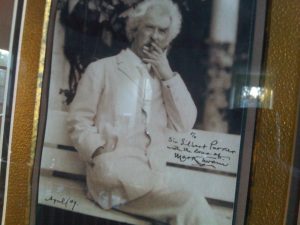Tag: mark twain
LOA BS
Someone on Facebook wrote a variation of this statement…
“Napoleon Hill said, ‘Whatever your mind can conceive and believe, it can achieve.’ This is the biggest load of monkey poo since the Law of Attraction. Right now, I am conceiving and believing that I can walk on water. Wish me luck.”
This is a wonderful example of illogical thinking.
Does the person really think they can walk on water?
Can they really imagine it?
Do they really believe it?
Obviously not.
And if they can’t, then they just proved Napoleon Hill right.
Hill said, “Whatever your mind can conceive and believe, it can achieve” and not “Whatever your mind can make up, even though you don’t really believe it and it’s not really possible, it can achieve.”
Big difference.
And please note that Hill said you can achieve it, not that you will achieve it.
He wisely left room for the possibility of you not actually attracting what you “conceive and believe.”
He knew you still had to work all the steps, including taking action.
His quote wasn’t just about conceiving and believing.
He said there were at least 16 laws, remember.
He wrote about them in such books as Laws of Success and of course Think and Grow Rich.
The ridicule people give the Law of Attraction or Napoleon Hill is a reflection of people’s own belief system – only they rarely see it.
I remember being in Russia at one of the many book signings and author meet and greets I did there.
An elderly gentleman in one audience said, “I really want to believe in this Law of Attraction but the skeptics make a good case against it.”
“Have you ever noticed that the skeptics seem to hang out together,” I began, “and the Law of Attraction positive thinkers seem to gather together?”
He smiled, nodding, as it dawned on him what I was saying.
“Everyone is living the Law of Attraction,” I explained, “but some know it consciously and others do not. You are free to believe what you like and you will attract whatever evidence you need to support your belief, even when it’s illogical to others. That’s the Law of Attraction.”
Remember, you get what you really believe, not what you want to believe.
In other words, when you examine your own statements, you might see the twisted logic behind them.
But like the person who posted the opening line, you probably won’t see the fallacy of your thinking without someone there to lovingly point it out to you.
This is why it’s so important to have a coach.
A coach can listen to you speak, reflect back to you the very beliefs you won’t even hear yourself saying, and help you question any beliefs that don’t serve you.
For example, the person who was poking holes at Napoleon Hill’s statement probably didn’t realize they weren’t being logical or even accurate. Seeing this blog post, they might grasp it.
But arguing for limitations seems silly to me.
Why argue against goals, success, visualization, positive thinking and the like?
Why not argue for them?
After all, the whole point is to help you achieve success.
Why not find ways to prove Napoleon Hill right?
Hill also wrote, “Think twice before you speak, because your words and influence will plant the seed of either success or failure in the mind of another.”
Anyone who tries to dismiss the positive and encouraging words of Hill is speaking without thinking.
More than that, they are raining on the hopes and dreams of other people.
That isn’t wise, kind, loving, or useful.
As Mark Twain said, “Keep away from people who try to belittle your ambitions. Small people always do that, but the really great make you feel that you, too, can become great.”
Napoleon Hill believed in you.
So do I.
Go for your dreams.
Ao Akua,
Joe
PS – For the record, I can walk on water. I’ve done it numerous times, usually in Ohio, usually during the Winter months. We called it ice.
PPS – I also found this on Facebook: “Dear Optimist, Pessimist and Realist: While you guys were arguing about the glass of water, I drank it.” – Opportunist
PPPS – And here’s Napoleon Hill himself giving you some coaching:
Mark Twain Mastermind
Many authors influenced my writing style.
Jack London, Shirley Jackson, Rod Serling, Robert Collier, William Saroyan and Mark Twain, to name a few.
Over the years I’ve attracted rare signed books by and about most of them.
Recently I took the prize by attracting one of the most sought after (and expensive) items of all: a photograph hand signed by Twain himself in 1909.
You have to imagine how this feels.
I wrote about Twain influencing me in such early books as CyberWriting, which was one of my first books on Internet marketing. (1995, now out of print.)
I’ve recently been reading volume one of Twain’s newly released uncensored autobiography, which is a delight.
And I’m greatly enjoying Michael Sheldon’s new biography, Mark Twain: Man in White: The Grand Adventure of His Final Years, which reveals the marketing savvy of the great author. The book explains a lot, including the reason Twain started wearing his famous white suit. I’m loving it.
For me to finally have this actual photo, which was Twain’s favorite, and held by Twain, and hand signed by Twain to a friend of his, is huge. It’s inspiring. It reminds me of what great authors and memorable writing are all about.
Looking at it mentally transports me to a place where I am sitting beside Twain, chatting, smoking a cigar, and laughing at life. I’m mind melding with the legend.
You can do this, too.
Just pick a person you admire, read everything by and about them, and then imagine having a dialogue with them. It’s a type of mental mastermind.
In my book on P.T. Barnum, There’s A Customer Born Every Minute, I include an interview with the great showman (who knew Twain and almost coauthored a book with him).
Obviously I never met Barnum. But I imagined what I would ask him, looked through his books for the answers, and turned it all into a dialogue. It’s one of the most popular sections of that book. (And it was recreated in theatrical form in my first Nightingale-Conant audio program, The Power of Outrageous Marketing.)
Again, you can do this, too.
If you had the chance, who would you brainstorm with?
Who would you interview?
Who would you talk to?
Ao Akua,
PS – One of my ancient articles on what an aspiring writer or speaker can learn from Mark Twain is still online at https://www.mrfire.com/article-archives/ancient-articles/mark-twain-secrets.html (It’s an excerpt from my out of print book, CyberWriting.)





